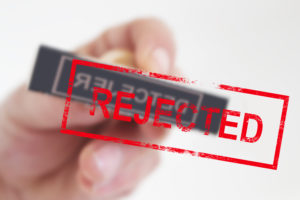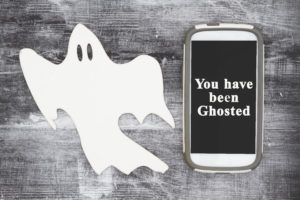The “R” Word–I See You!

So … here’s something we haven’t talked much about in WomanPause—the “R” word: REJECTION! I put it in all caps—and in bold—because that’s how big rejection can feel!
There’s rejection in love—ouch! Then there’s the rejection at job interviews or career setbacks, and the—all too common lately—rejection for having different political views. But there are so many smaller rejections we face every day. Hmmm. I wonder—is there even such a thing as a small rejection?
Someone may say “no” to us. It may be “no” to a small ask we put out to a friend or a social media post that received no “likes.” Maybe we initiate intimacy with our partner and our partner does not respond in kind. (I can’t believe I have yet to write a post about sex—coming soon!) All these rejections sting. Often much more than we would have anticipated.
But why?
According to psychologist Guy Winch in his article Why Rejection Hurts So Much, we are hard-wired to react this way. Scientists hooked people up to an MRI that measured reactions in their brains. When the study participants were asked to recall a recent rejection, researchers found that the recollection activated the same parts of the brain that activate when people experience physical pain!
“The Greatest Damage Rejection Causes Is Usually Self-Inflicted”
So that explains the biological reasons why rejection hurts, but we often, unintentionally amplify the pain involved in rejection. According to Winch, “the greatest damage rejection causes is usually self-inflicted.”
When we step out of our comfort zones by taking an emotional risk, we are sharing a part of ourselves that is either new to us or has been under wraps for some time. We are being brave and making ourselves vulnerable. Those are the times that rejection can feel the worst.
 Many times, when we’re rejected, we don’t just “lick our wounds.” Instead, we may take it a step—or several steps—further. We enter a self-critical spiral that can lead us to a pretty dark place.
Many times, when we’re rejected, we don’t just “lick our wounds.” Instead, we may take it a step—or several steps—further. We enter a self-critical spiral that can lead us to a pretty dark place.
Thankfully, there are things we can do to lessen the pain of rejection—and avoid that dark space.
Feel Those Uncomfortable Feelings!
(I know this has been a theme of late, but it is sooooooo worth repeating!) Acknowledge your embarrassment (if that’s what you’re feeling) or your hurt, anger, and disappointment. Once you do and you name your feeling–instead of burying it–you will be in a much better place to learn and grow.
Look at the Situation Honestly
Acknowledging your feelings means your feelings about the loss—not those you harbor towards the person who rejected you! (We’ve all been there—faulting the other or attacking him or her. It may feel delicious in the moment but attack mode never feels good for long!)
Looking at the situation honestly does not, however, mean taking on all the responsibility—or the blame! Women, especially, seem to have very powerful inner critics. We are often quick to blame ourselves and turn rejections into global statements of our self-worth!!
(I find this is especially true for me when I’m not feeling particularly strong or confident in my writing or in other areas of my life. Then, even a seemingly minor rejection can feels like a pile on—just another validations that I’m just not good enough.)
Don’t Let Someone Else’s Opinion Determine Your Self-Worth!
Amy Morin, in a short but helpful article in Forbes suggests that we refuse to let another’s reaction define our whole selves: “If you’re rejected by an employer you may conclude you’re completely incompetent. Or, if you’re rejected by a lover you may decide you’re unattractive. But those sweeping generalizations based on one person’s opinion will only hold you back… don’t allow your self-worth to be contingent on other people’s opinions.” AMEN Amy Morin!
Celebrate Your Courage!
 Practice self-compassion and celebrate your courage! Rejection often comes at the heels of our taking risks. Instead of retreating and making yourself small, congratulate yourself for taking that risk, for feeling that fear and not letting it stop you.
Practice self-compassion and celebrate your courage! Rejection often comes at the heels of our taking risks. Instead of retreating and making yourself small, congratulate yourself for taking that risk, for feeling that fear and not letting it stop you.
As a writer who submits LOTS of pieces to LOTS of literary journals, I encounter rejection of my work on a regular basis (sometimes more than one in one day)! Most days, I can just shrug those rejections off—they’re more of a nuisance than an insult. (Now, I have to submit the damn piece somewhere else!)
But I’ve noticed that when I’ve reached for the stars and get the “R,” my heart drops. I recently pitched an article to The Atlantic—yes that Atlantic. I haven’t received an actual rejection, but I’ve been ghosted—a form of rejection that can feel equally bad.
Don’t Let Being Ghosted Make You Feel Like You Have No Right to Exist!
I asked myself “Wasn’t I even worth the time it takes to send a “thank you but no thank you” form letter?”
Thankfully, I caught myself before I let that one get any teeth. (I’m getting pretty good at catching myself. I’ve had A LOT of practice with rejection!)
Here’s the critical piece that I caught: The word “I” in the question—“Wasn’t I even worth the time …”
 That tiny little word is actually huge! By using “I” in the question I asked myself, “Wasn’t I even worth the time …,” I made my whole self worth subject to a very busy editor’s response (or in this case, lack of response) to a pitch for my article.
That tiny little word is actually huge! By using “I” in the question I asked myself, “Wasn’t I even worth the time …,” I made my whole self worth subject to a very busy editor’s response (or in this case, lack of response) to a pitch for my article.
Ridiculous? YES! Do we do this sort of thing all the time? I try my hardest not to. Do you?
It is likely that my article didn’t meet The Atlantic’s needs. (Poor fit is often the reason behind rejections in many areas of life.) Maybe it was too long. Maybe it just felt long (see my example below). Maybe my pitch was not compelling enough to get the editor to even read the thing!
Having had some experience as an editor for a literary journal, I am aware that there are plenty of reasons submissions are rejected that have little to do with the work. But maybe my article was not up to their standards. That’s okay too, and this possibility leads me to the next handy tip for dealing with rejection.
Ask Yourself What You Can Learn from the Experience of Rejection. How Can You Grow?
My article may have been rejected–or ghosted–because it needed work. Where’s the shame in that?
Instead of ripping the article up and believing that it (and I) have no reason for existence, I sought out a few writers who have had success with major journalistic publications and asked for their feedback. I listened. Many of their suggestions were incredibly helpful. I am now reworking the piece, and I am confident that it will be a stronger article when I finish this next round of revisions. I will submit again. Wish me luck!
Call Upon Your Sense of Humor!
 Humor puts the world in perspective. Even when we’re in terrible pain, humor lets us know that we’re more than our difficult feelings—and the world is a wide and wonderful, albeit a pretty crazy place.
Humor puts the world in perspective. Even when we’re in terrible pain, humor lets us know that we’re more than our difficult feelings—and the world is a wide and wonderful, albeit a pretty crazy place.
So here’s a VERY funny example of a pretty TERRIBLE rejection I received from a literary journal about a year ago. It was for a flash piece I submitted (approximately 250 words) about the pandemic. Ready? Here’s the email I received:
Dear Diane,
Thank you for submitting ____ to our journal for publication. Unfortunately, we are going to pass. (So far, so good, but pay attention to the next line.)
While your piece was short, it felt long to us.
While your piece was short, it felt long to us. (No, they didn’t say it twice, but I couldn’t help repeating it!)
What does one do with a rejection like that?
I contend, there’s only one thing to do—laugh! And whenever I share this story, which I do quite often, that’s what people do. They laugh!
Part of the laughter may come from being slightly uncomfortable–and a little embarrassed for me.
Part of it may be a sense of relief, a “better you than me” feeling—maybe this reaction is not as kind, but human just the same.
But … it is that connection to the universality of those feelings of “ouch” that we all can relate to that most definitely drives the laughter—and I will even say joy—when people hear, and I share that story.
I See You
Laughter is medicine. In this case it connects me to others who’ve also faced rejection and reminds us all not to take others’ words and opinions so personally.
We have all faced rejection and will continue to, as long as we breathe and put ourselves out there in the world.
I, for one, am glad to still be breathing and stepping out into the light. I see you, dear readers, as you take your steps forward. Thank you for seeing me.
Do you have a particularly painful or especially funny rejection story you’d like to share? Where do you go when you face rejection? Where would you like to go? How can you get there?
As always, I’d love to hear your thoughts.
See you July 5th!
XOXO
Diane



Oh….I love you!! I miss you!! I admit, this (like so much of your work) brought tears to my eyes. Why not show up at residency this week? I sure miss seeing your EXTREMELY positive energy!!
Oh … I love you too, Janet!! Thanks so much about the post! I hope it made you smile too!! I haven’t been as present at residency because I’ve been sick the last week. Getting better, so I will pop in for sure. I did attend a couple (camera off, so look for my name) and saw your name and beautiful face! Miss you my dear friend!
Loved this!
Thanks, Denise!
Ha! Love this piece. My friend Julie, a fellow writer, used to paper her bathroom with her rejection letters. We used to read each other our favorite ones. I called her once to read her this one: “Alison, I don’t like your story. James.” She said “Hang on!” and scurried back to read me one she’d just gotten: “Julie, I don’t like your story. James.” Both of them written, weirdly but somehow not surprisingly, in CRAYON. You have to laugh. XOXO
Thanks, Alison! And what a wonderful idea–having a rejection buddy to share your rejections with! Gotta love the James story!! It definitely made me laugh! XO
Diane, I love your tenacity “(Now, I have to submit the damn piece somewhere else!)” and your fabulous sense of humor!! Thanks for sharing this great example of how we can choose to find the humor (when we’re ready) in a painful situation. You continue to remind us all of our resilience as bad-ass women. We don’t have to crumble and self-destruct if we experience rejection. We can feel all the feels and keep reaching for what we want most.
Thank you Sherry! That means a lot coming from another “bad-ass” resilient woman! No one has to “crumble and self-destruct if we experience rejection.” You say it so well! My wish is for all women to “feel all the feels and keep reaching for what we want most.”